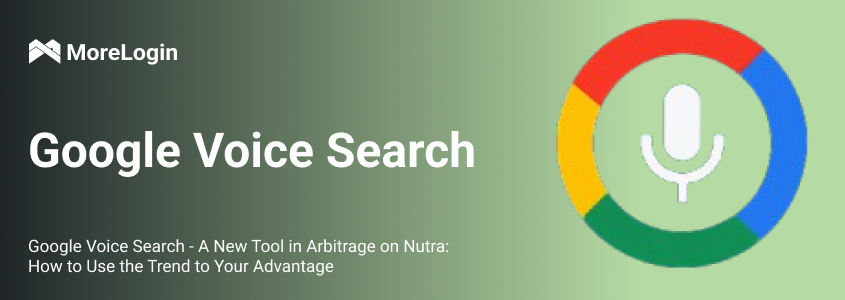
- Product

- Pricing
- Affiliate Program
- Use Cases
- Resource


According to various sources, voice assistants provide accurate answers to 93.7% of queries, and by 2023, the number of voice search users reached 125.2 million. More than half of the adult population uses voice search daily. This presents great opportunities for affiliates working with nutra through SEO and paid traffic. Below is an overview of how to adapt campaigns to the voice search trend.
Google Ads already supports voice query targeting. This opens access to an even broader audience — with minimal competition, as not many affiliates are currently using this approach.
With the growth of AI and voice-controlled gadgets (smartwatches, Alice, Marusya, smart home systems, etc.), users are increasingly dictating their queries instead of typing them. Voice input is faster and more convenient. At the same time, voice queries are becoming longer, more precise, and more emotional — which is a huge advantage when crafting creatives and unique selling propositions (USPs).
By adapting your campaign for voice search, you can become a niche leader and leave behind those who are still driving traffic using outdated methods.
Fact: Research shows that over 22% of users make purchases specifically through voice search. Your nutra audience is included in that number.
If you work with organic traffic, it's important to note: Google tends to rank websites optimized for voice search higher. Plus, the majority of voice search users are people aged 25–49 — an active and solvent audience for nutra offers (according to PwC and Invoca data).
Using voice search in nutra affiliate marketing is an effective strategy, but there are some nuances.
Tip: To minimize the risk of Google Ads account bans, consider using agency accounts. They are more reliable, often allow campaigns in gray verticals, and carry a higher trust level. Details can be found in our guide on agency accounts.
What to Keep in Mind When Creating a Voice Search Campaign
With voice input, people tend to phrase their queries in more detail. For example, instead of “joint pain pills,” they might ask, “what helps with knee pain and where can I buy it nearby?” Your semantic core should be built around these conversational, natural phrases.
Users expect precise answers to their questions. Use tools like Google Trends, Keyword Planner, and actual phrasing from your vertical — weight loss, vision, diabetes, etc. Don’t forget to consult with your affiliate manager — they often know exactly how the product is being searched in your target GEO.
Make sure your pages provide clear answers to frequently asked questions: safety, side effects, how long the product works, doctor opinions. Structure content in a tone close to natural, spoken language.
Include location-specific phrases like “where to buy near me.” Even if a user is looking for a physical store, they may be open to delivery and place an order.
For voice search, Google prioritizes fast websites. Reduce unnecessary scripts, optimize images, check your site on PageSpeed Insights, enable caching, and ensure you have an SSL certificate.
Your creatives and promotional materials should be pre-adapted for various devices before launching the campaign. Don’t rely on Google’s auto-optimization.
If you’re leveraging voice search for organic traffic, make sure to implement schema.org markup. This helps improve your site’s visibility in voice search results.
Voice users represent high-intent traffic. They know exactly what they want and usually phrase their queries as questions:
“how to lose weight fast?”, “what helps with diabetes?”, “what is the best treatment for varicose veins?”
According to seoClarity, nearly 20% of voice queries are built around 25 key words — including: “how,” “best,” “what,” “where,” and “easy.”
Your job is to address the customer’s pain points from the very first interaction — through headlines, descriptions, landing pages, and FAQs.
For affiliates running nutra offers, this is a goldmine — especially when paired with specialized tools like the anti-detect browser MoreLogin. It allows you to safely manage a large number of accounts, mask browser fingerprints, scale campaigns, and bypass bans.
Voice search means Google. And that means strict rules, frequent bans, and heightened scrutiny on affiliate accounts. This is where MoreLogin becomes your indispensable ally:
Multi-account management – You can run dozens of Google Ads accounts, each in an isolated environment, as if from a separate device.
Unique browser fingerprints – Helps prevent bans. Fingerprints don’t overlap, and fingerprint detection tools can’t flag your accounts.
Proxies + profiles – You can work with multiple GEOs, separate testing and scaling phases, and avoid account linkage issues.
Anti-detect compatibility – MoreLogin creates a full-fledged environment that mimics a real user’s setup, which is crucial when working with voice search traffic on Google.
Team collaboration – Easily delegate tasks among media buyers, test different funnels, and keep your entire team anonymous.
With this setup, you can scale voice traffic, launch creatives for different target segments, track performance, and run split tests with various strategies — all within a secure, controlled environment.
Voice search is more than just a trendy feature — it's a powerful tool for affiliates. It’s a way to attract high-intent users who are ready to buy. The key is to properly adapt your keywords, landing pages, and use agency accounts for stability.
While most competitors are still ignoring voice traffic, you have a real opportunity to take the lead — and turn a solid profit.